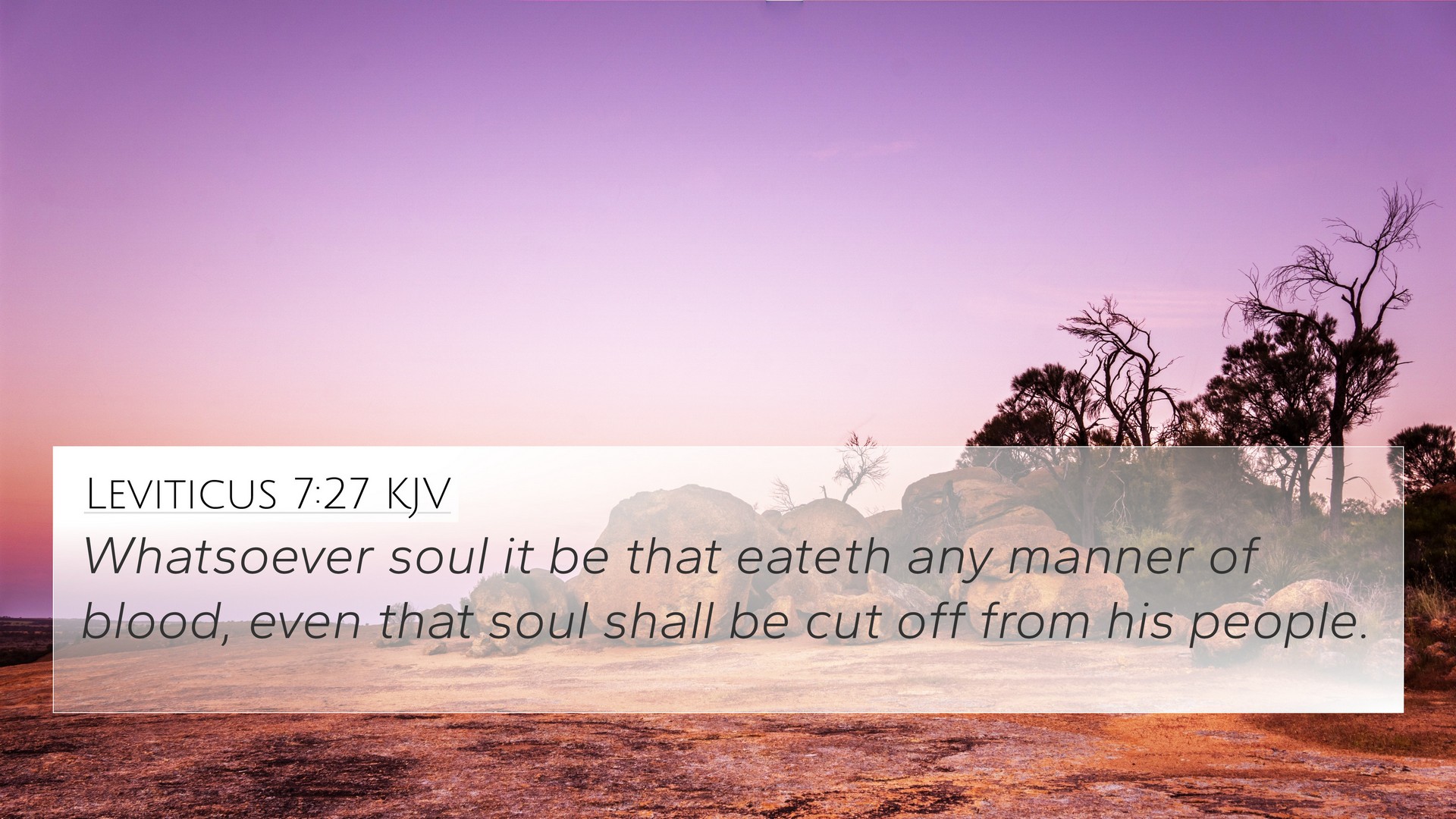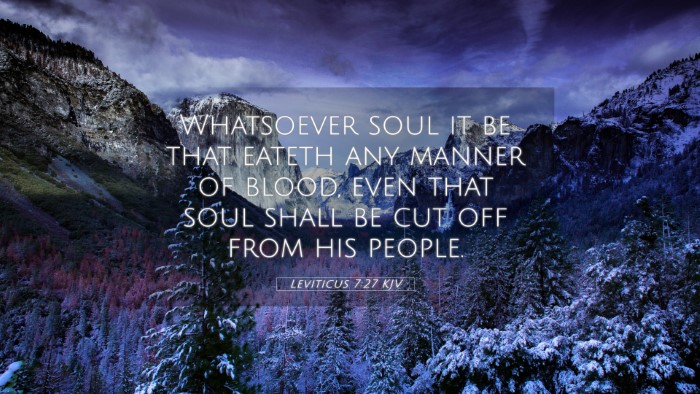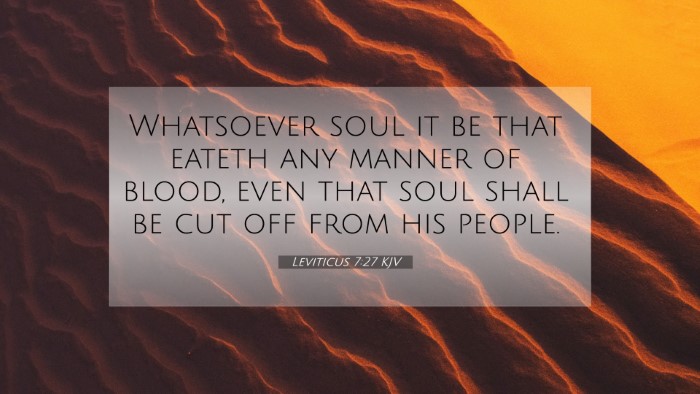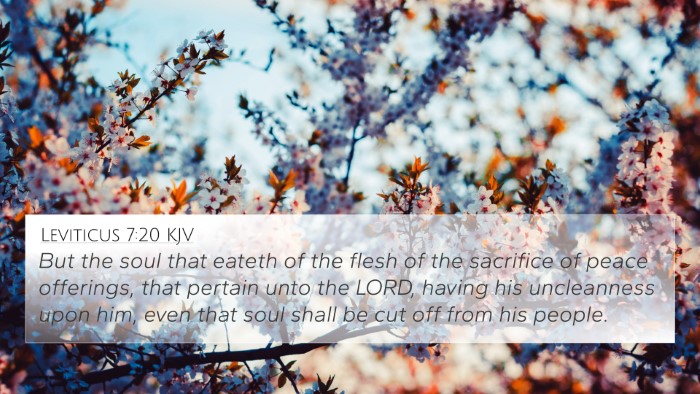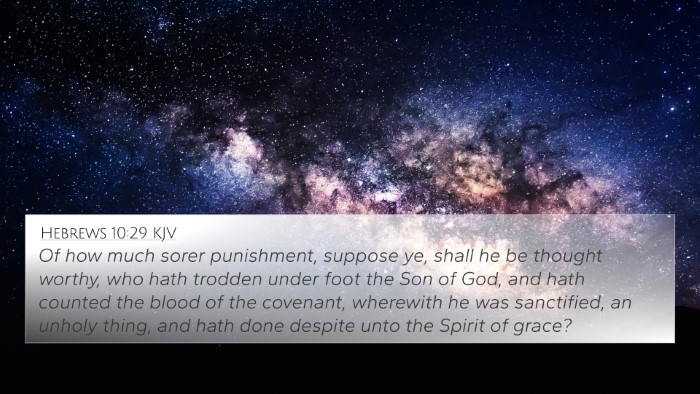Understanding Leviticus 7:27
Leviticus 7:27 reads: "And anyone who eats the blood of any creature must be cut off from his people." This verse is part of the Holiness Code in Leviticus that outlines the laws concerning sacrifices and dietary restrictions, particularly the prohibition against consuming blood.
Summary of Biblical Insights
Insights from various public domain commentaries offer a deeper understanding of this verse:
-
Matthew Henry:
Matthew Henry emphasizes the seriousness of the prohibition against consuming blood. According to him, blood symbolizes life and represents the atonement made for sin through the sacrificial system. Eating blood shows a direct disregard for God's commandments and the sanctity of life.
-
Albert Barnes:
Albert Barnes notes that this dietary law aims to reinforce the understanding of blood as sacred. He explains that the life force of the animal is in the blood, and God wants His people to recognize the special role blood plays in their covenant relationship with Him. This law serves as a reminder of the ultimate sacrifice that Christ would later make.
-
Adam Clarke:
Adam Clarke discusses the cultural implications of consuming blood in ancient practices. He suggests that the prohibition serves to set Israel apart from other nations that engaged in such practices. By refraining from blood, the Israelites were to maintain a distinct identity shaped by their relationship with God.
Significance of Blood in Biblical Theology
The command in Leviticus 7:27 strongly ties into the broader biblical theme of blood representing life and sin's atonement. It foreshadows the New Testament teachings about the blood of Christ and the necessity of His sacrifice for the forgiveness of sins.
Cross References
Leviticus 7:27 finds connections with several other scriptures that emphasize the significance of blood and the avoidance of consuming it:
- Genesis 9:4: Prohibits eating blood, reiterating that blood carries life.
- Leviticus 17:10-14: Expands the rule against consuming blood, giving rationale for its sanctity.
- Hebrews 9:22: Declares that without the shedding of blood, there is no forgiveness of sins.
- Exodus 12:13: The blood of the Passover lamb protects the Israelites, foreshadowing Christ's sacrifice.
- Matthew 26:28: Jesus speaks of His blood as the blood of the covenant, indicating its redemptive power.
- 1 Peter 1:18-19: References the precious blood of Christ, linking the concept of sacrifice and redemption.
- Romans 3:25: Discusses redemption through the blood of Christ.
Tools for Cross-Referencing Scripture
To better understand connections between Bible verses, one can utilize various tools such as:
- Bible Concordance
- Bible Cross-Reference Guide
- Bible Reference Resources
- Cross-Reference Bible Study Methods
Inter-Biblical Dialogue
One can find rich inter-Biblical dialogues by exploring how the theme of blood is addressed throughout both the Old and New Testaments. The teachings of the prophets often connect with the sacrificial laws in Leviticus and find fulfillment in the New Testament through the teachings of Jesus and His apostles.
Conclusion
Leviticus 7:27 serves as a crucial reminder of God's commandments about the sanctity of life and the seriousness with which He desires His people to regard the blood. By studying this verse in the context of scripture, and utilizing cross-referencing techniques, believers can gain a deeper understanding of biblical themes and their implications for faith and practice.
